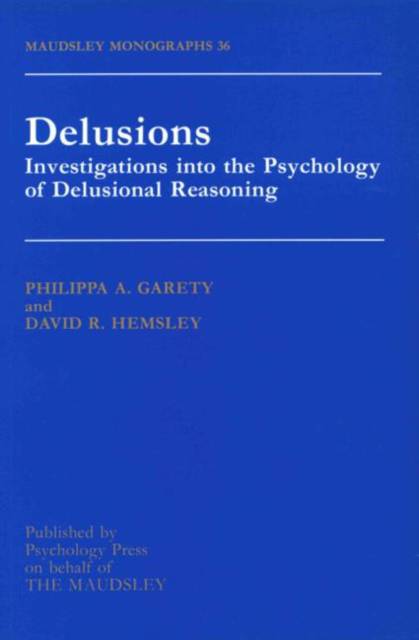
- Retrait gratuit dans votre magasin Club
- 7.000.000 titres dans notre catalogue
- Payer en toute sécurité
- Toujours un magasin près de chez vous
- Retrait gratuit dans votre magasin Club
- 7.000.0000 titres dans notre catalogue
- Payer en toute sécurité
- Toujours un magasin près de chez vous
Delusions
Investigations Into The Psychology Of Delusional Reasoning
Philippa a Garety, David R Hemsley
76,45 €
+ 152 points
Format
Description
The authors offer cogent reviews of the literature pertaining to the formation and maintenance of delusions, but the most substantial parts of the monograph expound the empirical inquiries which they and their colleagues have carried out in recent years. Most of the research has been published elsewhere, but such is the relevance of the experiments cited to the whole schema that the monograph has unique value. It is a synthesis which portrays the contribution to date of cognitive science to the biology and psychopathology of delusional thinking, and convincingly demonstrates that this way of looking at things has a considerable future. There are important implications for therapy as well as for hypothesis formulation. The monograph is attractively written, and the authors present their claims with exemplary modesty. The whole tenor of their approach gives weight to the conviction that here we have a story that must be taken seriously. It is a significant book, and I warmly commend it to all those with an interest in the future of psychopathology, and especially to psychiatrists who wish to advance their understanding of mental states and avoid stagnating with outworn dogma." - Robert Cawley, University of London in British Journal of Psychiatry Delusions are a key symptom of psychosis and yet there is no single book which considers delusions from a psychological perspective. In part this is because the syndrome of schizophrenia has captured the attention of many workers, and in part because delusions, as private mental phenomena, are not well suited to purely behavioural or observational methods of enquiry. For the past two decades, however, cognitive psychology has been in its ascendancy and delusions, as beliefs, are particularly amenable to investigation applying cognitive concepts and methods. Within this framework, it is possible to consider continuities between delusional and ordinary beliefs, as well as to seek to identify differences. This book, therefore, uniquely presents a psychological model of delusions, employing the neglected strategy of single symptom research and the tools of cognitive psychology
Spécifications
Parties prenantes
- Auteur(s) :
- Editeur:
Contenu
- Nombre de pages :
- 186
- Langue:
- Anglais
- Collection :
Caractéristiques
- EAN:
- 9780863777851
- Date de parution :
- 22-04-97
- Format:
- Livre broché
- Format numérique:
- Trade paperback (VS)
- Dimensions :
- 156 mm x 233 mm
- Poids :
- 272 g

Les avis
Nous publions uniquement les avis qui respectent les conditions requises. Consultez nos conditions pour les avis.






